- Home
- Nancy Means Wright
Broken Strings Page 17
Broken Strings Read online
Page 17
Afterward he walked down by the creek. It was nice down here. Sunny but cold this October day, leaves turning orange and gold. He’d like to take a walk with Chance. Talk about what they’d do after she graduated high school. Wanted her to graduate, not drop out like he did. Maybe they’d travel together. Sure, he was trying to get gigs in Britain for his band. They’d go to Glastonbury, initiate her into some of the magic. Show her the roots of that five-thousand-year-old yew tree.
He tried Chance’s cell again. Four times it rang and he was about to disconnect when a male voice said, “Yeah?”
Chapter Twelve
A Brown Spot in a Blue Eye and a Boat Horn.
Thursday, October 4
Fay was on her way to New London. She had to keep working, moving, it was all she could do now. Willard was teaching Glenna how to operate the strings, and if Chance didn’t come back by tomorrow, Stormy would do the fairy. It was all makeshift, but it was the best she could manage. She had to count on the police – though it had been two nights since Chance disappeared.
She wasn’t so worried about Beets now; the police would close in on that truck for sure. The caseworker didn’t like the way the driver had peeled off down the street. She hadn’t got the last number on the license but she had the rest. Higgins was glad for that. “We’ll get the kid for you,” he’d assured her. Though he said there’d be questions the boy would have to answer about the stolen rug and portrait. About Puss’s death, too, she thought. Poor lad. It’ll all be resolved by evening, she told herself: Chance and Beets both home. A final rehearsal – she’d give Beets a small part. He could at least help Ethan with the audio. Ethan had worked up a tape of background music to suit the mood of each scene. She’d praised him for it, and for once he’d actually smiled. She’d call his mother, she told him, and he hadn’t objected. Though Patsy was probably in Montreal with the new French lover. Too bad. The boy was growing up, fast. Patsy would miss a whole act of his life.
She was crossing the border now into New Hampshire, speeding down I-89. Nothing but fields and rocks and signs pointing to distant towns too small to have a gas station. At least she had her cell phone if she got in trouble. It was less than an hour from here to the Valentini house Puss had inherited after old Dominick died. She had to find Marion’s journal, or Puss’s, if there was one. She had to find something that would lead to a killer who might still kill – herself even, as a self-styled heir to Valentini’s Marionettes.
She swung into the driveway of the big white house. A For Sale sign stood in the front lawn. Cedric would have contacted New London Realty almost immediately. There had been money here all right; the house dwarfed the homes on either side. It needed painting though, for sure – Puss hadn’t kept it up. There was no sign of the little girl across the street. She drove the car around back and got out. She pulled out the bag she’d brought to stuff things into and slung it over her shoulder. If someone came and questioned her, she’d say she was interested in buying, just wanted to look around.
The bulkhead door lifted and she descended the steps. Something skittered across the floor. The basement seemed emptier than ever. The boxes were gone from the shelves. Someone had been here. Well, Cedric, of course, no doubt looking for something. Did he find it? She clenched her fists. He had no more right than she. He’d married Marion, not Puss. But he had it all now; he was the Valentini heir. Never mind that anonymous cousin, unmarried, according to Marion. Cedric was husband, brother-in-law, son-in-law.
The old Valentini puppets were gone, too, probably sold, without a nod to Fay. Or perhaps he was saving them to make her pay. ‘Another five thousand,’ he’d say, ‘and you can have them all.’
‘Sure, Ced, got it right here in my wallet.’
She went up the steps to the kitchen. Not a pot or serving dish in sight; he’d had a cleaning lady in here. There was furniture still in place in the living room and carefully waxed – “better to show the house, make it look homey,” she could hear the Realtor saying. No smell of baking bread, though, wasn’t that the other selling point? Fay had dated a Realtor once who’d sold so many houses she was afraid she’d be next. She imagined the ad: “Attractive country woman. Two ripe breasts, a full basement on two strong legs.”
The desk was empty. Only linens in the dining room buffet drawers, off-white and neatly pressed. A grand staircase ascending, circling, leveling out onto the second floor. The kind of staircase you walked down as a bride, everyone hushed and oohing: “Such a beautiful bride” – was it Puss? Ah, a full portrait on the staircase wall. On second look, it wasn’t Puss but Gloria: the thirties look, the bland face, bobbed hair, WASP eyes shining into the camera. The bride, ready for visitors: starched napkins, twelve sets of silver, linen sheets – a cheating husband.
Who was Honeysuckle?
She wasn’t upstairs either. The drawers were empty in the three bedrooms. Cedric had removed the life of the house. There was nothing left now but things. Things that told no story. Had she come all this way for nothing? Sighing, she opened one last closet, with folded sheets and pillow cases on the shelves – lavender sheets, obviously purchased by Puss. Or Gloria, don’t forget Gloria. The mother would have lived here with Puss until she grew too forgetful, sprinkled turtle food into the turkey stuffing.
The closet ceiling caught her eye. It was bulging as if it had something above it. She dragged a chair out of a bedroom. Standing on it she pushed, and the ceiling gave way. Whoa! A trap door to the attic. Clever. Old Valentini’s idea? Quickly she removed the clean linen and hoisted herself up. And voilà! A space approximately three-by-four feet. Fay could still crouch there without hitting her head. She discovered five boxes, a few hanging marionettes, an old sign that read VALENTINI MARIONETTES, World’s Fair, 1939. Costumes the puppeteer might have worn: top hats, black pantaloons, a faded red and yellow jacket. A basket full of colored shoes – Valentini was a flamboyant fellow, a charmer for his audience. For women as well? For that mysterious Honeysuckle?
She began with the biggest box marked MARION – and found gold.
When the cell phone rang an hour later she was still in Marion’s head. It was dazzling: the adventure at Glastonbury, the ritual, the magic, something Fay had experienced only in theater. This was a Marion Fay had never known but suspected, some other world deep inside the puppeteer. And the men in love with her! Someone she called A – “The return of Arthur.” As though she herself was Guinevere.
And the cell phone still rang. Dazed, she clicked it on. “Yes?”
“Sergeant Nova here. We have the boy, and a good thing. The man was driving with a suspended license, was a registered pedophile – but don’t worry, the boy’s all right. Just scared, that’s all, scared of us, scared to go home.”
“Thank God he’s safe!” Fay came slowly back from Glastonbury, back to reality. “You can keep him there till I get home? I’m in New Hampshire.”
“Most likely,” Nova said, and went on about an interrogation, something the boy might know about Puss’s demise. Anyway, they’d soon release him into her custody. Would she like to speak to the boy now? She would, of course!
“Beets, honey. We’re so glad you’re back. We were worried! You’re all right?”
“I think they’d like to keep me here,” Beets complained. “Put me in prison like Dad. They think I’m like him. I’m…” She could hear the waterfall of tears. It seemed to be falling right through the phone. She felt it in her own eyes, and reached for a tissue.
“They’re not going to keep you, sweetie. I’m in New Hampshire and have another quick stop, but I’m coming home. They just have to ask a few questions – it’s what cops do, you know.” Did Beets know that Puss was dead? Had he read a newspaper or heard a radio somewhere in his travels? Maybe not.
“I saw a skull guy,” he said. “Maybe the one Ethan saw on the web. He was carrying a big picture into a store. The picture was ugly. So was he.”
“Really? Oh, good boy!” She suddenly felt guilty for
not following up on the skull lead. “Where? Where did you see him?”
“Sorry, Fay.” Nova was back on the line. “But we have to talk to the boy now.” And then Higgins’ voice, though she didn’t want to speak to him at this point. Especially when she’d heard a car coming into the drive, a door slam, voices. “Got to go, Roy. Talk to you later.” She clicked off and stuffed the letters and photos into her canvas bag. She looked longingly at the box marked Dominick, but there wasn’t time to delve.
Lowering the trapdoor behind her, she climbed out of the closet and scurried down the steps. She lost her footing and the bag slid to the bottom, scattering its cache of papers. She slid behind it, landing on the bottom step.
“Oh, hi,” she said, peering up red-faced at the silver-haired Realtor and the middle-aged couple standing behind her. A good thing she was wearing pants!
After she’d explained herself and bombed out of there like a teenager caught torching a mailbox, she drove down to Route 11, through the center of town, and skidded to a stop in front of The Permanent Solution. She eschewed that name, reminiscent of the Holocaust, but when one looked at the name in relation to the anonymous Honeysuckle, it was apt.
The beauty parlor was a pink paradise, gleaming with mirrors, bottles, tubes; a woman under a dryer with a headpiece of wires like something out of Star Wars. Females in black capes: clipped, frizzed, and colored. A young girl weeping over hunks of her fallen hair – and the mother laughing: “You’re thirteen now, love.” As if thirteen was the age to grow up and be sensible. Fay thought of Chance, talking about going off with that Billy. She’d try Chance’s cell phone again, and then Billy’s number. Was it in the phone book?
When the mother had paid for the haircut and dragged the protesting girl out of the shop, Fay asked for a quick trim. “My hair’s a mess – I’ve been cutting it myself.”
“Some guy supposed to be in at two. But he’s late, so sit down if it’s just a trim.” The ringletted hairdresser frowned at Fay’s flyaway hair and brandished her scissors. “I can see you been doing it yourself, yeah. You from around here?”
“Passing through,” Fay said, “looking for someone and I saw your shop.” She handed the woman Puss’s card. “I saw her house up for sale. Do you know her?”
The woman’s face took a tumble, the lips sank at the corners. “You didn’t know?” She described the horrible death. “She was in here a lot,” she whispered, not wanting the clients to hear. “Advising, consulting, selling her products. Always beautifully dressed. We did her color, her perms. It was tragic what happened.” She grabbed a handful of Fay’s hair and cut. Fay gritted her teeth.
“Did her friend, um, name of Honeysuckle – a nickname maybe – ever come here?”
The woman looked blank. “Honeysuckle? Funny name for a woman. Sue, you remember a Honeysuckle coming in? Friend of Puss Valentini’s?”
Sue, who had short red dyed hair with a little pigtail in back, said, “Nope, I’d remember that name if she came in.” She went back to shaving the bent neck of a woman with what looked like a buzz cut.
“Sorry,” the hairdresser said when Fay cried “No shorter, please!” and greeted a young man sauntering through the door. “You were late, Al, you’ll have to wait.”
“I think Honeysuckle was a friend of Dominick Valentini’s,” Fay said. “I don’t know what her real name was. Unless it really was Honeysuckle.”
“Well,” said the hairdresser with the red dyed hair, looking up from her customer. “I saw Valentini with a blond woman once, down in Concord. They looked all lovey-dovey. Don’t know her name, though.”
“Tall blond woman with a brown spot in one blue eye?” the first hairdresser said. “She was in here once, if that’s who you’re talking about. I never knew her name. The brown spot woman came in one time for a perm.”
“We’re trying to locate her,” Fay said. “The lawyer who’s doing the will? Puss’s brother-in-law mentioned it. That’s why I’m asking.”
“What do you think, okay?” the hairdresser asked, handing Fay a mirror to see the back of her head. It looked too short, but what could she say? Except, “Fine. How much?” And then, “Think you could find the name of the brown-spot woman?”
“Well, I’ll try. Lot of people come in and out, you know. We’d have to remember what day it was, all that. And hey, I don’t write “brown spot” in the book. And then, if she was just a walk-in, we’d never write it down. Can’t look today.”
“I could call you tomorrow?”
“Around five. When things quiet down. I’ll see. Can’t make any promises though.
That lawyer’ll have to do his own hunting.”
“Thanks, I really appreciate it. I mean, I’m sure he will, in time. Lawyers are slow. Busy you know.”
“Busy counting their money,” the red-dyed hairdresser said, and both women giggled.
“By the way,” the first hairdresser said when Fay was at the door. “You could hide that gray in your hair, you know. A little color might knock off five years.”
“Five years? Really?” Fay said. “I’ll consider it.” Knowing she wouldn’t. Her acting days were over. What did the goats care what she looked like?
It was already two-thirty. She had to be home for the afternoon milking, a visit to Beets in the local lockup, and then a full dress rehearsal for Saturday’s show. She wondered if New Hampshire had a law forbidding drivers to use cell phones en route. They should, she thought, knowing how involved she’d get herself with some of these emotional calls. Nevertheless, she had a few to make. Willard should know they’d found Beets and she’d ask him to go see the boy before she could get there. And then to call the village school to confirm their presentation the next day, et cetera. It was the et ceteras that took most of her time. She started to dial Willard when the phone rang.
“Ms. Hubbard?” It was a male voice, somewhat familiar, but she couldn’t place it.
“Yes?”
“This is Bill Kidde.” He accented the final e – Kidd-eh. “I thought you should know. About your foster – about Chance, I mean. I called her cell again. I been calling since she, uh, took off the other night. I wasn’t going to call you but…”
My God, it was Chance’s Billy! “She’s with you?” Fay said, hearing her voice rise like an on-surging tide. “Where? Where are you? I want her home! She has school, you can’t take her away like that!” A car honked behind her. She’d drifted into the passing lane and just in time, swung back.
“No, she’s not with me. I don’t know where she is. But someone answered her cell when I tried to call. Look, can I talk to you? I need you to help find her.”
“Of course I want to find her. So, talk!”
“I can’t this minute,” he said. “I’m in rehearsal.” She could hear a guitar whanging in the background. “I’ll come over. Four-thirty if that’s…”
“Come! You’ll find me in the barn.” A truck was wheeling up behind and she clicked off. Lord, but she was a nervous wreck. Where was Chance if she wasn’t with Billy?
Fay wasn’t going to let this truck pass her. She jammed her foot down on the accelerator, shot up to seventy-five. She had to get home.
* * *
“I know you don’t like me,” Billy said, and saw her shoulders twitch. The woman was in jeans, squatting on an unpainted stool, leaning over a goat. The place stunk, but he tried not to show his disgust. The woman pointed at a stool and he sat – at a careful distance. She was hand-milking a scrawny goat she called Hester. It didn’t look like it was her favorite thing to do. One of Billy’s foster homes had been a farm. Not goats, but a couple of overweight sheep and around forty cows. Cows that never saw the outside of a barn. The guy didn’t hand-milk – he used a milking machine. Billy had helped operate it a couple of times; he wouldn’t want to handle those slimy teats.
“At least your goats can be out in the field,” he told the woman when she didn’t answer his comment about not liking him. But the answer was in the set
of her jaw.
“So what’s this you came to tell me. Or ask me?” she said, obviously wanting to cut the small talk. Worried about Chance. Like him. He felt easier knowing that.
The question hung between them like a shutting gate. Now that he was here he didn’t know how to begin. He watched her fingers pull on the teats. Watched the milk splash into the green pail. Goat’s milk. He put out a finger and then withdrew it.
She handed him a tin cup. “Try it if you want.”
The milk was thick and sour, but not unpleasant. At least it got his tongue moving. He told about Chance running off. “My sister was there, you see, we were, well, dancing, sort of. She was trying to show me a new move. And Chance thought, well, she probably thought – ”
“Thought you were making out. I can understand that.” Fay’s voice was crisp. She wanted him to get on with the story.
“She ran off. I called after her but my sister was, well, she can be demanding. I figured I’d call Chance’s cell and explain, give her a little time to cool down. But the next morning I saw she’d left her bike. That’s what – ”
The woman stopped milking, shooed away the goat and turned to stare at him. “But it wasn’t there today when I looked.” Some hairs were stuck to her cheek, with milk.
“I brought it in. We already had three thefts in our area. Kids, probably, but I didn’t want hers to be one of them.”
“Good.” The woman pushed back the stuck hairs. She was nice looking when she quit frowning. Big chocolate milk eyes. Chance said she’d been an actress. He thought of how women used their eyes in films, a come on. Chance got silly like that sometimes, batting her eyes, thrusting out her chest. He liked that. Sometimes she seemed older than him.
“So then what?” the woman said. “She ran off and you didn’t hear from her for two nights? You said something about her cell phone?” The milky eyes were eating him up. He rolled his tongue around his bottom lip. He definitely found her attractive.

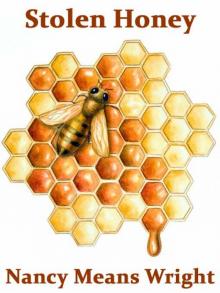 Stolen Honey
Stolen Honey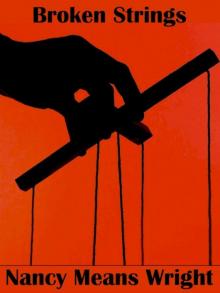 Broken Strings
Broken Strings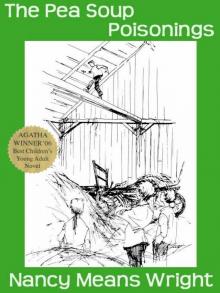 The Pea Soup Poisonings
The Pea Soup Poisonings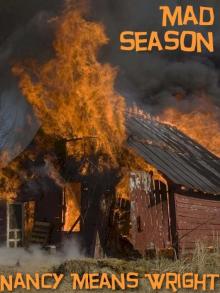 Mad Season
Mad Season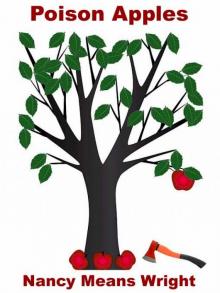 Poison Apples
Poison Apples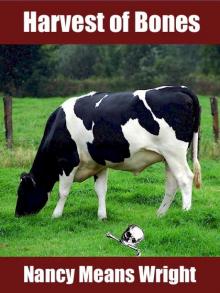 Harvest of Bones
Harvest of Bones